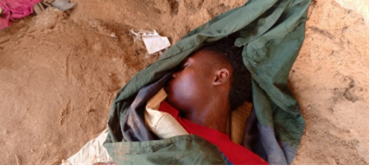The escalating crisis of synthetic drug abuse in Liberia has tragically claimed another young life, highlighting the urgent need for intensified intervention. Hanson Flomo, a man in his early twenties, succumbed to the devastating effects of “Android Spark and Die,” a highly potent and lethal narcotic rapidly gaining notoriety within the country. His untimely death underscores the devastating impact of this dangerous substance on Liberia’s vulnerable youth population, mirroring the struggles of countless individuals battling addiction in the face of limited resources and support systems. Hanson’s father, Harris Flomo, expressed profound grief and urged other young people to avoid the perilous path of drug abuse, emphasizing the urgency of addressing this growing epidemic before it claims more lives. Hanson’s story, marked by his descent from a promising student at St. Martin’s Catholic High School to a victim of substance abuse, serves as a stark reminder of the devastating consequences of addiction.
Hanson’s tragic demise is not an isolated incident. Several other young lives have been lost to the grip of “Sparking Android,” a synthetic drug known for its rapid and often fatal effects. Reports indicate that this substance can cause either instantaneous death or severe mental breakdown, leaving families and communities grappling with the devastating consequences. Just days after Hanson’s death, another unidentified youth in Monrovia’s Old Road community fell victim to the same drug, further amplifying the alarming trend. Additional reports and photographic evidence confirm the presence of this deadly substance in other communities, including Bushrod Island’s CEMENCO Community, painting a grim picture of its widespread impact.
Since President Joseph Nyuma Boakai declared a national anti-drug campaign, the situation has only worsened. Estimates suggest that over fifty disadvantaged youths, often referred to as “Zogos,” have lost their lives to “Sparking Android” and similar substances across the country. These deaths are occurring at an alarming rate, averaging more than one per day, primarily concentrated in densely populated areas, particularly in Montserrado County. The rapid escalation of drug-related fatalities, especially among young people aged 15-30, has placed an immense strain on Liberia’s healthcare system, law enforcement agencies, and social welfare programs.
The surge in drug-related deaths reveals the multifaceted nature of the crisis, encompassing not only the immediate dangers of these substances but also the underlying social and economic factors that contribute to vulnerability. Many of the victims are disadvantaged youths, highlighting the need for targeted interventions that address poverty, lack of education, and limited access to healthcare. The alarming rate of fatalities suggests a desperate need for increased public awareness campaigns, improved access to rehabilitation facilities, and stronger law enforcement efforts to curb the supply and distribution of these deadly narcotics.
While President Boakai’s anti-drug campaign has raised awareness about the issue, the escalating death toll underscores the need for more comprehensive and effective measures. Families and community leaders are calling for immediate and decisive action, emphasizing the urgency of the situation. The campaign’s current efforts appear insufficient to combat the rapidly spreading crisis, highlighting the need for increased resources, strategic collaboration among government agencies, and community-based initiatives to tackle the root causes of drug abuse. Furthermore, implementing harm reduction strategies, such as providing access to naloxone, could potentially save lives by reversing opioid overdoses.
The escalating crisis of synthetic drug abuse in Liberia demands a multi-pronged approach that addresses both the immediate and underlying causes. Strengthening law enforcement efforts to disrupt the supply chain of these deadly substances is crucial. Simultaneously, investing in prevention and rehabilitation programs, providing adequate resources to support families and communities affected by drug abuse, and addressing the socio-economic factors that contribute to vulnerability are essential for long-term solutions. The tragic deaths of Hanson Flomo and countless others serve as a wake-up call, demanding immediate and sustained action to prevent further loss of life and protect the future of Liberia’s youth. Only a comprehensive and collaborative approach involving government agencies, community organizations, and international partners can effectively combat this devastating epidemic and offer hope to those struggling with addiction.














